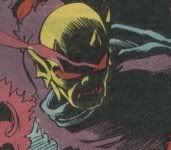 Originally conceived by Jack Kirby, a comic book legend in his time, the character of Etrigan the Demon really took off with the amazing four issue mini-series by Matt Wagner, a writer and artist of immense talents who also had previously brought us Grendel, a stylish series about a thief named Hunter Rose.
Originally conceived by Jack Kirby, a comic book legend in his time, the character of Etrigan the Demon really took off with the amazing four issue mini-series by Matt Wagner, a writer and artist of immense talents who also had previously brought us Grendel, a stylish series about a thief named Hunter Rose.The basic premise of the Demon has been that in Ancient Britain, the wizard Merlin bound the demon Etrigan to his services on Earth, but couldn't just have him hanging around all the time, so when he didn't need Etrigan, he just tucked him inside of the milquetoast Jason Blood. Which didn't really make Jason too happy. Or Etrigan, for that matter.
Think of a metaphysical The Defiant Ones, and you've kind of got it.

Still, whenever the need arose and some bad guy was brought out by someone like Morgan La Fey or Klarion the Witch Boy, Jason Blood would shout out the words:
- Gone, Gone, o form of man!
And rise the demon, Etrigan!
After Alan Moore (of Swamp Thing and V for Vendetta fame) had finished writing the character, the full poem that released Etrigan was typically a variation of:
- Yarva Demonicus Etrigan.
Change, change the form of man.
Free the prince forever damned.
Free the might from fleshy mire.
Boil the blood in heart of fire.
Gone, gone the form of man,
Rise the demon Etrigan!
For me, from a writer's craft perspective, he's a good character because when he's written well, there are many readings and interpretations possible without being heavy-handed or contrived about it. Flexibile, yet distinctive.
As an Asian American reader? I can certainly make the obvious snarky statement: Etrigan is a yellow guy who gets bossed around by an old white guy to do his demonic dirty work, and has to spend the rest of his time being bored out of his skull taking a back seat to Jason Blood, who just whines and moans all the time.
The fact that Etrigan also speaks in rhyme, (if not exactly poetry) earns him a big plus in my book, of course.
But that's selling us all short here, so I'll elaborate on the Matt Wagner mini-series, which is to this day still the definitive take on the character for me.
As a preface, throughout the Kirby series, while Jason Blood was resentful and hated his relationship with Etrigan, he rarely did anything about it.
By the time we get to Matt Wagner's mini-series, however, things have changed, and we're taken to a Jason Blood and an Etrigan who are both at their last wits end chafing at the arrangement, but now, they finally have a means to free themselves.
If they're willing to make a choice, a stand after all of these centuries and act like they have free will.
Of course, the forces of both Hell and Merlin don't want Etrigan running free of Jason Blood so they start sending demons and the like after the two of them and their friends.
Much action ensues, and it's interesting because unlike most superhero comics, we have a story of two people who are being 'selfish' in trying not to solve the world's problems, but their own for a change. And are they more driven as a result?
And will the world be a better place for it?
Frankly, the Wagner mini-series is quite darkly ruthless as we see what happens to Jason Blood's 'friends' who are largely not so much friends as 'people unlucky enough to meet him.'
Along the way, we learn more of the true origins of Etrigan, who his father really was, and also his half-brother, creating an almost Grecian or Shakespearian story of family and the quest not for redemption, but freedom and self-liberation.
Here, we explore what it means to be true to our true natures and yet discovering that our desired freedom might come only by fighting that same basic nature we want to express.
It's hard to find complete sets of The Demon nowadays.
The later comic series lost sight of what Wagner was really demonstrating makes Etrigan such a delicious anti-hero. A demon, who, even though we know the world will be the worse for his success, we can't help but root for.
And, if nothing else, The Demon has also taken a great stand against racism, as seen in this panel from the regular series of The Demon (#48) when he's going up against the Kings of Hate and starts laying the smack down:

No comments:
Post a Comment